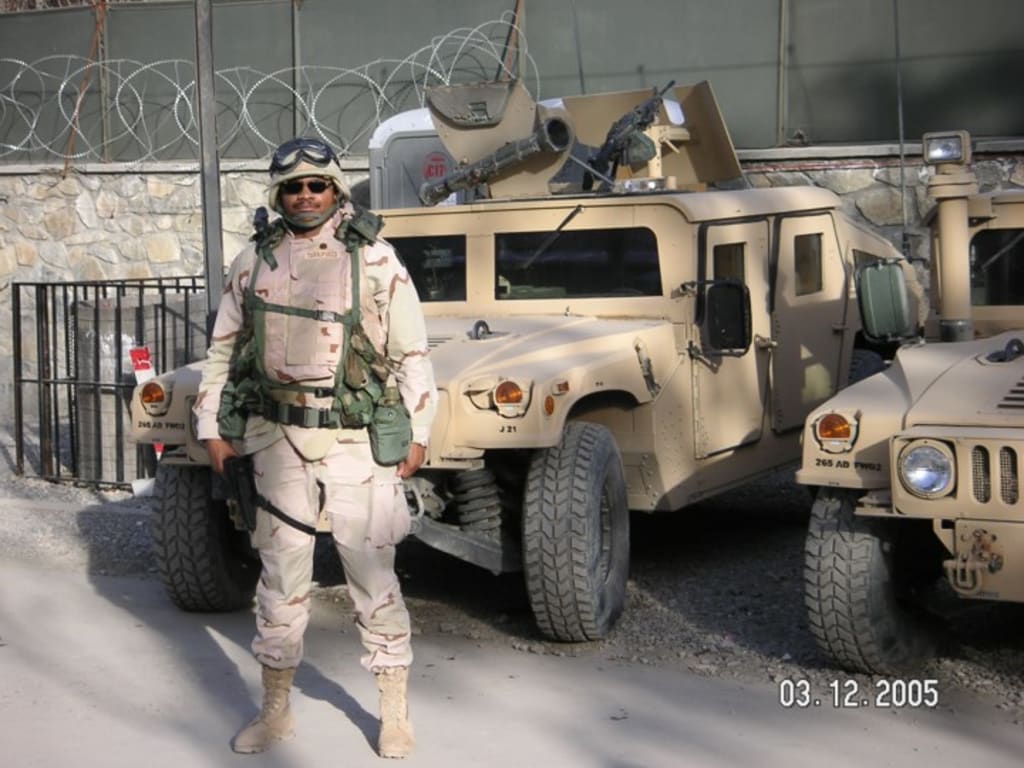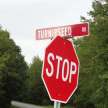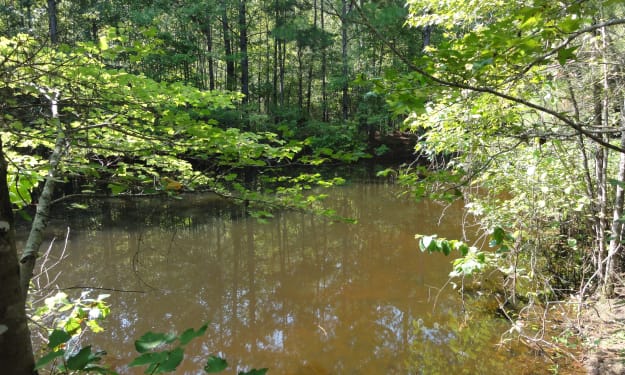The Kabul I Knew
A Month In Afghanistan

Thomas Wolfe said, “You Can’t Go Home Again”. Most of us are biased toward happy memories, because unhappy ones make us sad, and who wants to be sad? But things change, including you, so any place you remember after an extended absence simply cannot be the same place when you return thereunto. Thus, you can’t go home again. And me, I can’t go to Kabul again. Yes, that Kabul. Afghanistan.
I am Timothy James Turnipseed, “indeed”, US Army Lieutenant Colonel (retired). And this, is the Kabul I knew.
I landed in Bagram Air Base, Afghanistan in late February of 2005, a Major in the Army of the United States. It was the fourth year since 9/11.
I hadn’t deployed with a unit. Rather, I was sent as an Individual Augmentee, i.e. by myself. As you will soon learn, that was… an issue.
Afghanistan has infamously brutal winters, but I don’t remember it being cold. I do remember going into a tent PX (Post Exchange) and seeing the entire back wall stacked from bottom to the top with X-box game consoles. I was reminded of George Washington’s troops at Valley Forge, freezing, dying from lack of basic supplies, reduced to eating their horses. Clearly, I thought, the logistics of the American military have vastly improved in the meantime.
I also found time to visit a local bazaar. That American Soldiers could safely go to an Afghan bazaar shows we had the security situation well in hand, at least around Bagram. Every TV show and movie was available, so I bought the then-current season of “Smallville” on DVD.
I also bought an antique British musket. I imagined it had come from Elphinstone’s disastrous retreat from Kabul in 1842. That’s when some 4,500 British and Indian troops along with their 12,000 civilian dependents and camp followers were annihilated by Afghan tribesmen as they tried to retreat 90 miles to Jalalabad through the snows of the Hindu Kush. The British had made a deal with the Afghans for safe passage, which apparently didn't work out. Thankfully, no other country would ever made such a mistake again.
Someone at the bazaar also had Soviet Army medals for sale. I guessed the Russians who originally owned those medals must have lost them or something. I bought two. The musket I still have, but sadly, my Russian medals were stolen along with a laptop some 5 years later.
Now it was time to go to work! “I’m the Third Army Liaison,” I explained at headquarters, but no one seemed to know what that was. Eventually, I was told it was down in Kabul, capital of Afghanistan.
Now, I had like five bags of issued equipment, personal items, armor, weapons, and ammo. I piled it all in an unarmored civilian vehicle, and someone was assigned to drive me to Kabul, which was about an hour and a half drive. Either the security situation was so handled a uniformed American officer could ride around the Afghan countryside unescorted and in an unarmored vehicle, or someone didn’t like me. The driver did tell me to point his rifle out the window, so there’s that.
The road from Bagram to Kabul had a lot of potholes, which the locals filled in with dirt. As it was explained to me, the dirt would get washed out with every rain, and then the locals would fill the potholes again. On the way, we came upon a gully washed out of the road, so the car had to slow to a crawl to safely navigate it. Some opportunistic Afghan had set up a shipping container shop right by the gully. Finally, we reached Kabul.
Now it was time to go to work! “I’m the Third Army Liaison,” I explained at headquarters, but no one seemed to know what that was. I maneuvered all my stuff to my assigned room, but someone with higher rank didn’t want a roommate, so I had to move all my stuff all over again to another room. The stuff was very heavy; easily at least 200 pounds.
While in Kabul, a Lieutenant Colonel tried to convince me be an ANA (Afghan National Army) Recruiter.
“You mean we go outside the wire into people’s private homes and try get them to join the Afghan Army?” I asked, incredulous.
“Yes,” the man answered. “We get to meet the real people we’re trying to help on a personal basis and convince them to serve their country. We can’t stay here forever you know; someone’s got to hold this place down once we leave.”
“Does the Taliban appreciate us running around recruiting their enemies?”
“Relax, brother!” (He was also Black) “It’s not near as dangerous as it sounds.”
“Okay sir,” I replied, “I’ll think about it.”
I was thinking “NO!”, but I was thinking about it. Which is a shame really. Jesus said, “let your yes be yes and your no be no”. I should have just been honest with him.
Eventually, the folks in Kabul decided the Third Army Liaison position was actually at Bagram Air Base. So, I piled all my heavy stuff in yet another unarmored civilian vehicle and headed from Kabul back to Bagram.
At Bagram, billeting found me a nice, spacious room with its own latrine and no roommates – a luxury afforded very few Soldiers in combat zones. I spent the night there and considered myself lucky to have found such a nice home for my tour.
Now it was time to go to work! “I’m the Third Army Liaison,” I explained at headquarters, but no one seemed to know what that was. It was time for a different tactic:
“What do you need done, sir?” I asked.
“Well, would you like to be an ANA recruiter?”
“Um… no.”
“Well, you’re a Signal Officer. How good are you at managing and monitoring satellite systems?”
“I can do it, sir! Is my office in this building?”
“Oh, it’s not here, Major. It's down in Kabul.”
*KHAAAAAAN!* I screamed, but of course it was internally.
So, I piled all my heavy stuff in yet another unarmored civilian vehicle and headed from Bagram back down to Kabul.
I was posted at Camp Eggers, located near the US Embassy and the Afghan Presidential Palace. There was no more room for billeting on base, so I was sent to a large house out in the city. The house was surrounded by a fortified courtyard, and there were sniper screens blocking the windows. Security was provided by local Afghans; men in traditional dress equipped with AK-47s. These were Hamid Karzai’s “boys”, as he was the President of Afghanistan at the time, and he and his “tribe” fully supported us Americans; a decision they would surely never regret.
The house – a mansion, really – was packed, with all rooms but the main living room and the bathrooms converted to bedrooms, with three or four men in each. I did find one bedroom with only one person’s gear in it, so there I went.
There was a place in the house where you could drop off your uniforms, and the local Afghans would clean, press, starch, and then return them to the drop-off point. (This was back when we were encouraged to press and starch our field uniforms. No, really).
I put my 9mm Barretta under my pillow, watched several episodes of “Smallville” on my personal DVD player, and then went to sleep. When I awoke the next morning, I found a huge blue, ornately decorated Koran on my roommate’s bed.
Back on base, I monitored all the satellite links. As these were vital communication arteries, including Internet, for both Americans and our Allies, I felt honored to be entrusted with such responsibility. I worked with the help of a huge monitor dominating one wall in the room. There was a similar screen in a virtually identical room across the hall. I don’t know the official purpose for that screen, but the team over there divided their screen four ways so it could be all Halo, all the time. Yes, “Halo” the video game created by Bungie and published by Xbox Game Studios.
One of the people on my team was from Denmark. He was a great guy, but instead of calling him by his name, I just called “Danish” for some reason. If I offended him, he never let me know. Indeed, I got to see and talk to all kinds of people, Finns, Germans, French, Koreans, Aussies etc., plus of course the Afghans. I also attended a worship service with an American missionary who was ministering to the locals in an underground church.
I’ll say one thing – the American people sure do love their military personnel! We were deluged with cards, letters, games, books, and treats, including Girl Scout Cookies, candy… you name it. Almost everyone had more “pogey bait” than he or she could handle, and we liberally spread the wealth. And to top it off, the dining facility served the best military-provided food I ever had. Whatever else was going to happen in Afghanistan, I would not go hungry.
One day, I arrived at work only to find I had left something vital back at my place (I knew if I lived long enough, I'd finally make a mistake). So, I went out and hailed a cab. These were not marked as taxis, but were unmarked cars driven by locals. Each of these cabs had a laminated placard on the dashboard to let you know it was safe to ride in the car, because no terrorist would ever steal that placard. The taxi service was completely free to us servicemembers. American taxpayers, not so much.
So, the guy drove me back to my house, where I got what I needed. But on the return trip, I noticed something was… off.
By that point, I had memorized the route between my place and Camp Eggers, but this driver was taking me through a part of the city I had never seen before. Feeling a mounting sense of dread, I pulled my pistol from my thigh holster and racked the slide to put a round in the chamber, ready to go. Then I politely asked my driver where we were going. He explained how he normally takes me by a mosque, but it was Friday, and time for worship services, so he didn’t want the worshippers to see him with an American Soldier in his car. This explanation made sense to me, and sure enough, I was safely returned to base, where I cleared the weapon and returned it to my holster.
At one point, I joined a couple of US Marines on a tour through the city. One Marine was the Driver, the other his Assistant Driver. The vehicle we used was… you guessed it… unarmored and unarmed. I got to see the sights, including what remained of the old Medieval walls and fortresses. I noted the dense crowds of pedestrians sharing the roads with all manner of cars, trucks, and military vehicles, as well as wagons and carts drawn by horses, mules, or donkeys. Important buildings were surrounded by concrete barriers to foil VBIEDs (Vehicle-borne Improvised Explosive Devices, pronounced “vee-beds”).
Lurid billboards and murals advertised western name brand products, praised President Karzai, or warned of the dangers of opium; the Afghan version of “Just Say No to Drugs”. I suspect their “Just Say No” campaign was every bit as effective in Afghanistan as ours was in the United States.
The Marines decided to get something to eat from the locals, which seemed sketchy to me. I mean, Afghanistan doesn’t have the FDA or Health Inspectors, and their hygiene practices are… less than ideal. On the other hand, as a field-grade Army officer, I was not about to wuss out in front of two young enlisted Marines. Whatever they ate, I ate, and honestly, it was very good. The fresh-baked naan was particularly delicious.
Remember my Muslim roommate from a few paragraphs back? He invited me along for an expedition outside the city. This time, we went in armored vehicles and “full battle rattle”. It’s been 16 years, but I ‘m still not going to tell you what the mission was. I’m not even going to name the impressive landmark near there, because I don’t want to ID the village.
Boys swarmed us when we stepped out of the heavily armored vehicles. The village Elders were among them carrying sticks, and whenever they thought a boy was in our way or being disrespectful to us, they would whack him with a stick right in front of us.
I didn’t see any women; I suspect they were all at home. As for the girls, we were told they were in school, as these people did not allow boys and girls to attend school together. I hope those girls got a good education, because it seems a sure bet their daughters won’t.
The villagers couldn’t be friendlier or more hospitable. We accomplished the mission with no issues and returned home. I remember being disappointed that no actual combat had occurred during the mission. Then I reminded myself why wishing for combat was exceedingly stupid, and to thank God it didn’t happen.
I was in Kabul for about a month when word reached me that I was in the wrong place; the Third Army Liaison position was in a completely different country. I wasn’t supposed to be in Afghanistan at all!
The former Liaison who called me was very upset, because he had not been allowed to go home until I had properly relieved him. As a matter of fact, he warned me in a voice saturated with emotion how he was going to kick the crap out of me, except he used a word other than “crap”. Indeed, the Army threatened UCMJ action against me for failure to follow orders. Fortunately for me, the orders I carried said “BAGRAM” and “AFGHANISTAN” plain as day, so they had to let the matter drop.
So, I left Afghanistan and went to the place I was supposed to be all along. I even met the man I was replacing and had a brief, heart to heart with him. Turns out, he was half my size, older, and didn’t want to kick the crap out of me after all.
I would not return to Afghanistan until 2014, when I served as the Director of Information Management for Kandahar Airfield; this time for a full tour, and with rather more explosions.
What do I think of the current situation? Well, forgive me for Monday morning quarterbacking, but it seems to me we could have done three things:
1. Set an extraction date well before the published extraction date.
2. Got American and Allied civilians out, including our Afghans partners.
3. THEN extracted our military.
Removing virtually all our military and then trusting the Taliban to get our civilians and Afghan partners to safety – to the point our government even gave them their names – does not appear to have been the best plan.
Today is 27 August 2021. I hope I can add a future edit to this essay about how all our people, particularly and especially the civilians, were safely evacuated. But from the way things look now... yeah.
I remember the Afghans I met and can still see the smiling faces of the kids in that village. Hopefully, they are not currently experiencing a painful, and/or fatal lesson in how not to be nice to Americans. I would say to those poor people what I often say to my college Students and to myself. It is easy to say, but often hard to do, and I suspect it is several orders of magnitude harder if you happen to be trapped in Afghanistan. Still, here it is:
Run the Race, Keep the Faith. Endure to the End.
About the Creator
Timothy James Turnipseed
Timothy was raised on a farm in rural Mississippi. His experiences have since taken him all around the world. He now teaches at local university, where he urges his Students to Run the Race, Keep the faith, and Endure to the End






Comments
There are no comments for this story
Be the first to respond and start the conversation.